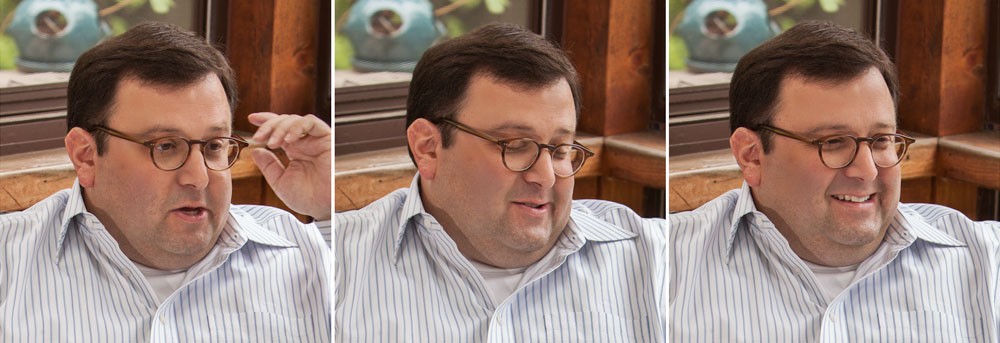by Vivian Henoch
Robb Lippitt, the self-effacing CEO of Revolution Dancewear, likes to introduce himself as “a stocky, middle-aged Jewish man with a hole on top of his head where there used to be hair.”
Standing in his favorite spot in his kitchen, checking email on his laptop, chatting with us about life with teen daughters as his wife, Debbie, makes us a cup of tea, Robb would seem the epitome of a family man, at home anywhere he sets his mind to work. From his quiet, easy demeanor, one would never guess just how much enterprise he’s got on his plate.
The fact that his company recently has gone global, growing by leaps and bounds out of offices in Niles, Illinois, and England, would be enough to keep Robb in perpetual motion. He is, in fact, involved in two businesses—as Co-Founder of Scrapbuck.com, he admits that being involved in two companies “catering almost entirely to women is a source of endless amusement (and presumed secret jealousy) to his friends.”
Whatever the notion of “full time” means to Robb, his portfolio of community projects and charitable activities reads like a CV. Among NEXTGen Detroiters, he is considered a “rock star,” and is currently an officer of the Detroit Federation. On the national level, he serves as Co-Chair for Jewish Federation of North America’s (JFNA) National Young Leadership Cabinet, extending his six-year term a year to do so.
When not on the road between his “day jobs,” or flying around the world on behalf of the Jewish community, Robb is an avid tennis player, a great cook, a long-abiding fan of The Princess Bride, and author of a children’s book, The Tomatonator, soon to be published. He and his wife Debbie are blessed with two daughters, Molly 15 and Eryn 13, both of whom, according to Robb, are “thankfully smarter than he is and far better looking.”

On early influences
myJewishDetroit: Robb, you’ve been a practicing attorney, a consultant and a partner involved in building and growing numerous businesses from tech start-ups to global companies. You say you’re not an entrepreneur, but clearly you have an entrepreneurial spirit. How did you get your start?
I’d say that my parents—both Detroiters—were my first “business mentors.”
My father was in sales in the women’s clothing business, which kept us moving around a lot when I was a kid. But, eventually, we moved back home to Detroit, and my dad bought a business. But it was the wrong business at the wrong time and he had some unfortunate luck with it. He then went back to law school at night, working full-time during the day, while my Mom went to work in the jewelry business full-time. I was in high school at the time. As a result, I had to work my way both through college at U of M and law school at Wayne State.
My dad became a successful attorney and my mom became very successful in her job as well. It all worked out for them beautifully.
“Seeing my parents’ determination, their ability to change and adapt and to take on difficult circumstances and stay strong together—that was great learning.”
My parents gave me the benefit of having to take on more responsibility than I would have otherwise and that was very shaping in a positive way as well.
On college and first career moves
myJewishDetroit: What kind of work did you do in college?
I was involved with selling computer equipment and computer networks. This was a time when i386 computers ran entire networks and a PC was just a PC. But in the process, I learned a lot about technology and computers and also some things about running a business.
In law school, I worked as a law clerk (much more than I actually went to class!). While practicing law for eight years in Birmingham—specializing in in business litigation—I met a lot of people who were business owners and entrepreneurs, including Josh Linkner, who became a client and a friend. Josh had founded ePrize. Fortunately for me he took a chance on me, and I joined him fairly soon after as the Chief Operating Officer. We grew that business together, along with the hard work of many others.
So in a nutshell, that’s the story of how I got from law to business to running a business. . .
myJewishDetroit: How did you make the connection with Revolution Dancewear?
While I was helping build ePrize, I joined the Jewish Entrepreneurs Network—a Federation outreach program that brought different entrepreneurs and business people together for a shared peer experience.
One of the people in my group was the founder of Revolution Dancewear—Scott Harris. We became friends, advisors to one another’s businesses, and when I left ePrize, I started getting involved in consulting work for Revolution. I assisted Scott as he sold the business to private equity investors in 2010, ended up with a seat on the Board, and ultimately they asked me to come in to run the business.
I’ve been at Revolution since 2011 and I love the business. We’ve grown to more than 100 employees, made two acquisitions, and last year we sold many hundreds of thousands of tights, leotards, costumes and dance shoes to dance studios. It’s a fun business that makes people happy.
On personal strengths and connections
myJewishDetroit: Robb, your business acumen certainly translates to your community work. What would you say are your greatest strengths?
What I’ve been able to learn to do well is to help businesses grow.
“Growing a business—in fact growing any organization—is about developing people.”
Whether that’s in Federation life or business life, I think that one of my skill sets is creating things and building them, seeing a vision and being able to make that vision reality.
I believe my role in life—and something I can do well—is binding communities together. Whether you define a community as people in an office environment, a charitable organization or our Detroit community—the dynamic is still the same—engaging people and creating relationships for accomplishing a shared purpose and vision.
On giving back
myJewishDetroit: So there’s a Federation connection to your success in business?
Yes, when I think back on the Federation version of the story, there’s really nothing that I’ve done in my life that isn’t somehow connected to my family and Jewish community. People talk about volunteers giving back, but the truth is that I’ve gotten so much more from my involvement in Federation than I could ever give back in time or money.
I met Scott Harris, my Revolution Dancewear partner, through a Federation program. I commute to Chicago every week, and I live in a condo that I rent from my friend Hannan Lis (a Detroiter and prominent Jewish leader). My business peer group that came together through Federation all are still very active in the community.
So many relationships that I have, as well as the opportunities to work, and the places I’ve gotten to see—are derived from Federation.
On work-life balance
myJewishDetroit: How do you juggle your leadership roles in your professional and community work?
I view my life as interconnected in every way and don’t make strong distinctions between my professional time, my philanthropic time.
“I get great satisfaction and joy out of being part of a team, watching people grow and growing myself, and I get exactly the same experience out of being part of the community and giving back as I do in my business.”
The added benefit of the community work is making a difference in people’s lives. While it’s true in business that you impact lives, in philanthropy—giving back to the community—you are doing it for people who often have no ability to do it for themselves.
On leadership development
myJewishDetroit: Most people are unaware of Federation’s role on the national and global scale. Please tell us about the Young Leadership Cabinet.
“Cabinet” is about 300 community leaders from across North America—working through a six year leadership development program, focused on campaign leadership and philanthropic development.
As part of Cabinet we do “study missions” every year, traveling to different countries. I’ve now been on five such missions: first to Sarajevo and Budapest; next to Morocco, a mission which I co-led; Argentina and Chile the following year; Greece the year after that; and most recently, St. Petersburg, Helsinki and Stockholm.
I’ve been to Israel twice, and also was honored to participate in the Ethiopian Mission with the Sherman Leadership Program here in Detroit—an extraordinary experience in 2011.
Tying this back to NEXTGen Detroit in particular: the message we’re trying to deliver on a national scale is that there’s not a “one-size-fits-all” model for engaging the community. Federation is different for everybody.
As Jewish leaders, we are most effective when we listen first and understand what naturally motivates people, where their interests lie, what excites them on their own. There are so many ways that we can take what people already are excited about and connect that to their Judaism and, ultimately, to giving back to the community.
On the image of Jewish Detroit
Being from Detroit is extraordinary in the way our community is perceived in the national and international Jewish landscape – in dramatic contrast with people’s generalized fear and perception of the city.
Jewish Detroit is the cream of the crop, esteemed as a model of transformation and togetherness, and that’s something that’s very exciting to see.
And the things that I’ve learned in Cabinet have informed the things that I have worked on here in Detroit. And likewise, with Federation CEO Scott Kaufman at the helm and Miryam Rosenzweig (NEXTGen Director) along with so many others, our work here has been influenced by what I bring to my role as Cabinet Co-Chair.
On lessons learned
Through my many roles, I’ve learned that the most powerful leadership is not positional: it’s by action and in-the-moment.
“A true leader is not necessarily the person in front of the room or the one holding the gavel. It’s the person who’s comes to the table and makes the choice to change the dynamic of what’s happening.”
The lesson in all this: leadership is showing up, saying yes. There’s power—even magic—to saying yes.
On what to tell people considering moving back to Detroit
There’s no place like Detroit because Detroiters have an extreme shared sense of identity. In this community—Jewish or not Jewish—when you say you are from Detroit, there’s a deep resonance for what that means. It’s a shared experience, with a longing to invent, and build a better place, too.
That’s what brings a community together.
So I say to people, Detroit is a great place to live; I can’t image a better place to raise a family; there’s fabulous cost of living here, great schools, great homes, especially as a Jew, there’s no better Jewish community anywhere.
To come to a community where you’re embraced by the community, where there will be opportunities to get involved, where people are connected to their neighbors, that’s a rare and beautiful thing to find.
Favorites
Restaurant: Lafayette Coney Island… iconic Detroit!
Coffee hang-out: Starbucks across from Federation
Building in the Detroit skyline: Comerica Park—we’re huge Tiger fans.
Place to take kids: DIA—for little ones, there’s really nothing for them to bump into.
Jewish food: Matzo ball soup
Home Recipe: My Marinara Sauce (I always get great feedback.)
Jewish expression: Oy!
Reading now
Just finished The Invisible Bridge, by Julie Orringer, a novel set in Hungary in the time of the Nazis, examines the less tangible costs of war. A beautiful book.




